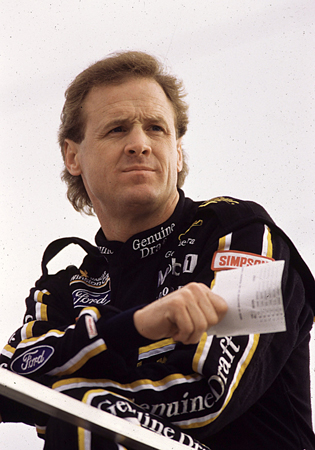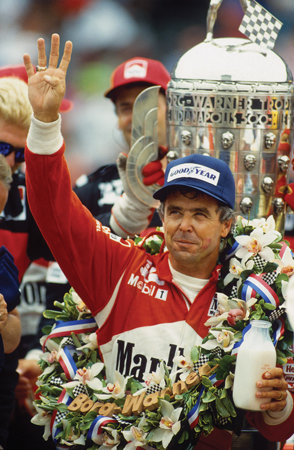RUSTY WALLACE
 |
“Every time we showed up, we were prepared, neat appearing, our cars, show cars, our people — and we always tried to over-deliver.”
RUSTY WALLACE
Photo by: GETTY IMAGES
|
“I met Roger Penske through Don Miller, who lived in St. Louis, Mo., like me. Don was a rep for Roger, doing a lot of his apparel things, show car programs, stuff like that. And I was a hotshot young guy in St. Louis winning all the short-track races; I didn’t even know Roger. But I met Don and I told him, ‘Man, I’d sure love to get to the big time somehow.’ So Don introduced me to Roger, who said, ‘Let me give this kid a go.’ So in 1980, we had a car and took it to Atlanta and I finished second in my first race for Roger Penske. But after that, I kind of fell on my ass. And Roger said, ‘Look, kid, go back and get some experience, and when you get more experience, give me a call.”
“My very worst experience ever with Roger [as far as tongue lashings] was in Michigan for one of the races. I had come off of qualifying bad for just about every single race for whatever reason and then come back from the back of the pack and winning these races. I’m winning, winning, winning — but qualifying terrible, terrible, terrible. So Roger on that particular day in Michigan has a ton of guests coming, and I’m qualifying [poorly] again. And Roger got me and [crew chief] Robin Pemberton cornered in the administration building at Michigan and said, ‘This has got to stop, this is ridiculous.’
“I said, ‘Roger, we’re winning, though.’ He said, ‘I’m tired of starting at the front of the field [with my eyes] and walking all the way to the very back to find my car. And it’s embarrassing for when I get all of my customers to show up to watch you and you’re in the back of the pack. No more of this bad-qualifying crap; you guys figure out what’s going wrong.’ And I said, ‘OK, I understand.’
“And so that race we qualify like 30th; I come from the back to the front and I won. He gets into victory lane and looks at Robin and I, with nobody knowing he was doing this, he shook his head and said, ‘You two [expletive] guys,’ like we were this evil duo that was trying to [mess] with him.”
“It was just customer service [as far as taking care of sponsors], that was the big thing. Every time we showed up, we were prepared, neat appearing, our cars, show cars, our people — and we always tried to over-deliver. I didn’t try to barely deliver and barely make them happy, barely check the box — we want to over-deliver. No knock on a lot of young guys out there nowadays, but a lot of guys don’t like doing [sponsor events] nowadays. I actually embraced it and I enjoyed it, so I learned that from Roger.”
“I talk to him about once every two weeks [to this day]; we text mostly: ‘What’s going?’ I can pick the phone up right now and call him. He’d say, ‘Hey, what’s up?’ I’d say, ‘Nothing, man, I’m down in Mexico.’ He’d say, ‘What are you doing there? You should be back here working!’ That’s what he’d say. He’d laugh a little bit, and that’s how it’d go.”
RICK MEARS
 |
“He’s good at seeing where people are and what they are, where they’re at and what they need.”
RICK MEARS
Photo by: GETTY IMAGES
|
“At the time when [Roger recruited me], it was probably as big a surprise to me as anybody. I was just starting out and had been with a couple small teams. I was knocking on doors at the time, looking for a ride and didn’t have any idea of driving for Roger; Indy cars were out of my league. I figured he was out of my league also, so I was just knocking on doors. And the way it all came about was on a motorcycle ride.
“Now when I look back— after being with Roger and seeing the way he operated over the years — part of the reason he was on the ride was to see me away from the track, which I had no idea at the time. But we’re on this motorcycle ride — picture Roger on a dirt bike in 1980 in the Colorado rockies — and we were just chatting one morning and he said, ‘I hear you’re thinking about driving for so and so.’ And I said, ‘Well, no, not really. I hear you’re thinking about hiring so and so.’ And he said, ‘No, but I’ve got something in mind. Give me a call before you make a deal with anybody else.’ And I about fell over.”
“He never really pushed anything with me [pressure-wise]. One of the great things with Roger, is when I first started, he said, ‘Hey, you go out and get laps. I’ve got Andretti, Unser, Sneva — these guys to stand on the gas. You go out and get the experience, just take your time.’ He was great with taking the pressure off of me. That’s how a team works: You have the other team players there to take the pressure off to let me learn at my pace. So he’s good at seeing where people are and what they are, where they’re at and what they need.”
“Whatever I needed to do to help take care of the sponsors I wanted to do because I knew in the long run it helps us all get to achieve what we’re trying to achieve here. So he always set the bar and standard with that. He’s kind of always been ahead of the game on moving the goalposts. Whether it was guys showing up with the button-down shirts instead of T-shirts and being clean shaven, or slacks instead of jeans — whatever. He raised the bar across the board in the industry. … The cleanliness, the organization — everybody always put it on money, and I got so tired of hearing that. I remember walking in the garage one night [before signing with Penske], and I walked by Penske’s garage to get to mine, and when I got to his garage and looked in the door, the floors were clean, everything was painted the same color, everything had its place, everything was hung on the wall and organized. That’s not money, that’s organization. I thought, ‘OK, if I had a sponsor patch on my arm, trying to persuade them to help us out, and I walked by his garage to get to mine, and they saw his and they looked at mine, who are they going to go with?’ That’s absolutely from the top down. You’d show up to the track and Roger would be standing there with a broom, sweeping the floor.”
“Not long after he had purchased Detroit Diesel, he had just refurbished this whole distribution plant, cleaned it up, organized it. He’s got thousands of people working there and had kind of a family day grand opening after the refurbishment. Myself [and some other drivers] went, too, and we got up and did our dog-and-pony show, meet and greet a little bit, then afterward there was an autograph table with Roger, myself and [other drivers]. Pretty soon this couple comes up and Roger starts saying, ‘What can I do for you?’ And the employee’s wife starts laughing. And he says, ‘What’s so funny?’ And she says, ‘Are you kidding me? I used to have to kick him out of bed to get him to go to work; now, he’s up and gone before I know it.’ And that just hit the nail on the head. He instills in people that they are a part of the company and all of a sudden [that employee] has an interest in it. I thought, ‘There it is: That’s exactly what he does.’”





